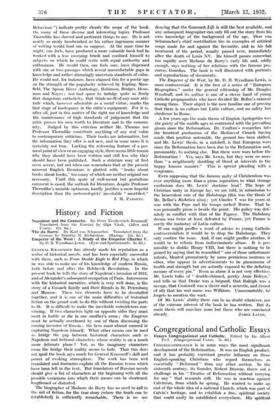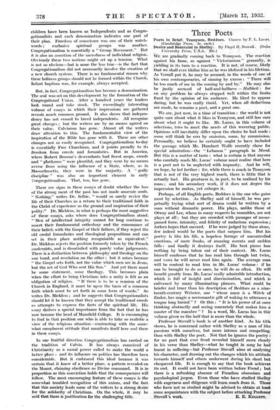Congregational and Catholic EssayS`
Essays Congregational and Catholic. Edited by Dr. Albeit Peel. (Congregational Union. 7s. 6d.) CONGRECATIONALIS5I is in some ways the- most . significant development of the Reformation. It was an English product, and it has probably exercised greater influence on those English-speaking Christians who regard themselves as essentially " Reformed " than any other section. In the sixteenth century, its founder, Robert Browne, threw out a challenge in his " Treatise of Reformation without tarrying for any " that resounds- still. He was in reaction against Calvinism, from which he sprang. He wanted to make an end of the whole idea of a national Church, which was part of Calvin's heritage, and to establish a free, spiritual society that could easily be established everywhere. His spiriting
children have been (mown as Independents and as Congre- gationalists and each denomination indicates one part of their plan. Freedom of conscience was one of their watch- words ; exclusive spiritual groups was another. Congregationalism is essentially a " Group Movement." But it is also an assertion of the sacredness of individual religion. Obviously these two notions might set up a tension. What is not so obvious—but is none the less true—is the fact that Congregationalism did not necessarily involve the creation of a new church system. There is no fundamental reason why these holiness groups should not be formed within the Church. Infant baptism was, for example, always accepted.
But, in fact, Congregationalism has become a denomination. The seal was set on this development- by the formation of the Congregational Union. After a hundred years the leaders look round and take stock. The exceedingly interesting volume of essays in which their impressions are gathered reveals much common ground. It also shows that indepen- dency has pot ceased to breed independents. All recognize great changes ; but the writers are by no means agreed on their value. 'Calvinism has gone.' Almost all the writers draw attention to this. The fundamentalist view of the inspiration of the Bible has gone with it. There are other changes not so easily recognized. Congregationalism to-day is essentially Free Churchism, and it points proudly to its freedom from creeds and formularies. But in America, where Robert Browne's descendants had freest scope, creeds and " platforms " were plentiful, and they were by no means averse from using the influence of a State, where, as in Massachusetts, they were in the majority. A " godly discipline " was also an important element in early ongregationalism. That, too, has gone.
There are signs in these essays of doubt whether the loss of the strong meat of the past has not made anaemic souls.
Nothing," writes Dr. Selbie, " would so surely revive the life of their Churches as a return to their traditional faith in the Christ of experience as the ground and inspiration of their polity." Dr. Micklem, in what is perhaps the most suggestive of these essays, asks where does Congregationalism stand. – Men of intellectual integrity cannot for long continue to assert their fundamental orthodoxy and the consonance of their beliefs with the Gospel of their fathers, if they reject the old credal formularies and theological propositions and can set in their place nothing recognisable as equivalent." Dr. Micklem rejects the position formerly taken by the French modernists, and is dissatisfied with purely value judgements. There is a distinction between philosophy and theology on the one hand, and revelation on the other ; but it arises because " the Gospel sets forth, not the value which men see in Jesus, but the net of God Who sent His Son." And yet there must lbe some statement, some theology. This becomes plain when the effort to bring Christians into a unity is felt as an 'obligation of religion. " If there is to be a reunion of the 'Church in England, it must- be upon the basis of a common faith which must be set forth in some form of words." So :writes Dr. Micklem ; and he suggests that Congregationalists should let it be known that they accept the traditional creeds as attempts to express the facts of the spiritual life. His essay derives a special importance from the fact that he has now become the head of Mansfield College. It is encouraging to find in that position one who is able to take so realistic a stew of the religious situation—contrasting with the some- what complacent attitude that manifests itself here and there in these essays.
. In one fruitful direction Congregationalism has carried on the tradition of Calvin. It has always conceived of Christianity as a moral power called to make the world a better place : and its influence on politics has therefore been considerable. But it embraced this ideal because it was certain that it knew of a better place, a pattern revealed on the Mount, claiming obedience as Divine command. It is in proportion as this conviction-holds that the consequences will follow. The most encouraging feature of these essays is the somewhat troubled recognition of this axiom, _and the fact. that this anxiety leads some of the writers to a strong desire for the solidarity of Christians. On the whole, it . may be said that there is justification for the challenging title.



















































 Previous page
Previous page